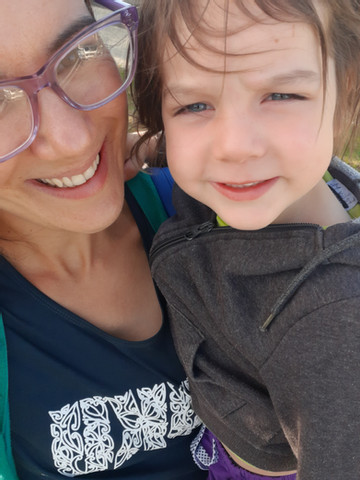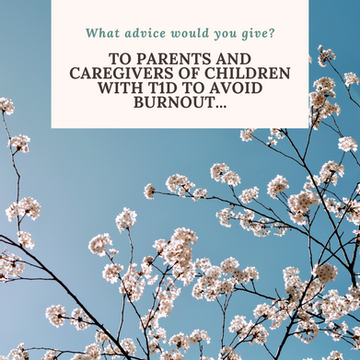Our parents and caregivers are the MVP

We saw five doctors, tried Ventolin, antibiotics and Loraped and still had no answers. Even a blood test left us wondering what was going on. The light at the end of the tunnel grew dimmer and it was deflating to imagine that this was just how it was going to be. Finally an x-ray confirmed he has Asthma and we’ve been prescribed a Flixotide inhaler.
Don’t take it on entirely yourself, even if that feels safest. Rally the troops. Resource your community. Ask for help. Take a break. @thediabetictherapist
I am a parent of now 2 diabetic children aged 7… I’ve accepted a bit more help the second time around from family and friends and it’s really helped, but I have found it very hard to actually accept it! @amanda_tobin
Share and talk about what you are dealing with. Even with those who have no experience of diabetes. Accept their help. Define what help might consist of so when someone offers you can pick something off that list for them to do. Then don’t feel guilty if they are doing it. @jill.calogaras

I have 2 type one diabetic children. Just remember no two days are ever the same with this condition. It’s a roller coaster to say the least. Breath… you are doing an awesome job as a parent of a type 1. My eldest was diagnosed at 2.5 years old and it now 17. My youngest was diagnosed at 10 and is now 14. We have no choice with this… we do the best we can. There have been many ups and downs, sleepless nights and exhaustion! I would take this away from them if I could and wish it was me everyday. You learn to live with type one. It becomes a part of you, a part of life. You are all an inspiration, and no one really gets it until you live it. @EmmaTaylor
Find your village. Join the local t1 youth group and get to know other t1 parents. You are going to need some support. Other parents with t1 kids will become your best friends so find 1 or 2 people that you connect with so you have someone to fall back on. They get it. @LenaFendley
Respond to the number, but don’t let them control you. @jamieelizabethgodfrey
- Celebrate every little success
When you finally get a full night’s sleep, celebrate! Blood sugars in range for the afternoon, celebrate! You laugh so hard you snort, celebrate!
- Ask for help
I found this tough. Silly I know, especially because we so desperately needed help. When you’re experiencing a ‘good patch’ make a list of things that people can help with if or when things become hard again. E.g dropping off dinner, picking the kids up from school, folding the washing, walking the dog.
If I was feeling overwhelmed at work I’d have no trouble asking for help. In fact research shows that our managers and colleagues respect and trust us more if we do. So why is it hard to do this at home? Asking for and accepting help shows strength.
I’ve been reading ‘Dare to Lead. Brave work. Tough conversations. Whole hearts.’ By Brené Brown and cried when I stumbled across this part in the book.
“When you are operating in a space of non-judgement – I can ask for what I need, and you can ask for what you need – then we can talk about how we feel without fear or judgement. When I start to feel that smugness or judgement welling up, I immediately think, “What’s the insecurity, Brene?
Asking for help is a power move. It’s a sign of strength to ask and a sign of strength to fight off judgement when other people raise their hands. It reflects a self-awareness that is an essential element in braving trust.”
- Make time for your partner and your relationship
It’s easy to believe you and your partner are on different pages and the constant snapping and bickering is a sign your relationship is on shaky ground. It maybe the sleep deprivation and stress fooling you.
My husband said to me late one night after a particularly tense weekend “We don’t need a marriage counsellor, we need some sleep.” He was 100% right. We also found that making time for the two of us helped also. Book that date night and reconnect. Or if it’s easier a date lunch or afternoon when the kids are at school or daycare.
- Look after YOU
When you’re trying to be everything to everyone it’s easy to overlook the basics that keep you feeling strong and healthy and therefore better prepared to handle what’s thrown at you. Are you drinking enough water, eating well and moving your body?
- Talk to someone
A problem shared can often feel like it halves the problem. Discuss what you’re going through with a friend, colleague, someone from the online diabetes community or a counsellor. They don’t need to be able to fix your situation, they just need to listen.
We recently arrived at a family birthday after a difficult morning at home. We quickly noticed that sharing our struggles made the load feel a little lighter.
- Cut yourself some slack
It may not feel like it at times, but you’re doing an incredible job! You are more than enough.
- Sleep on it
Avoid making drastic decisions during this time. It’s highly likely that you’re tired. Go to bed early, sleep on it and see how you feel in the morning.
Practical help available in New Zealand
Carer Support: “Carer Support provides reimbursement of some of the costs of using a support person to care and support someone with a health condition, disability or injury. This means the full-time carer can take some time out for themselves.
NOTE: Not all areas in New Zealand are eligible for Carer Support for young people with Diabetes. Check with your medical team as to whether it applies to your area and how many days your young person is entitled to.
Refer to the Diabetes NZ website for more information about how to apply for Carer Support.
Counselling (possibly)
Speaking to someone about what’s going on at home and the effects mimicking a pancreas are having on you can help you feel better equipped to navigate whatever type 1 diabetes throws at you. Speak to your diabetes team about what support is available within your DHB. Unfortunately at this stage it sounds as though the services offered are different around the country.
Join the Type 1 diabetes online community
Reach out and connect with people that get it! You are not alone in this journey.
- Type 1 diabetes New Zealand – https://www.facebook.com/groups/93863821525/
- Diabetes Parents Unite NZ – Parents Page https://www.facebook.com/groups/diabetesparentsunite/
Connect with your local diabetes support group
There are a number of diabetes youth support groups around the country offering education sessions, camps, coffee catch ups and events for children with Type 1 and their parents.
The Diabetes NZ website can be a good place to start. Alternatively your diabetes team will be able to let you know what’s available in your neighbourhood.
Bellyful New Zealand
Bellyful provide meals to families with newborn babies, and families with young children who are struggling with illness.
Not having to think about dinner for a couple of nights can make a difference. https://www.bellyful.org.nz/
Ma tini ma mano ka rap ate whai. Many hands make light work. Unity is strength.
Hurihia to aroaro kit e ra tukuna to atarangi kia taka ki muri I a koe. Turn your face to the sun and the shadows fall behind you.
